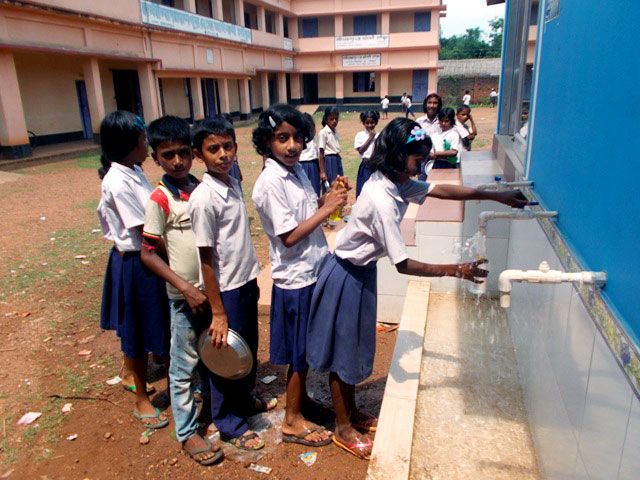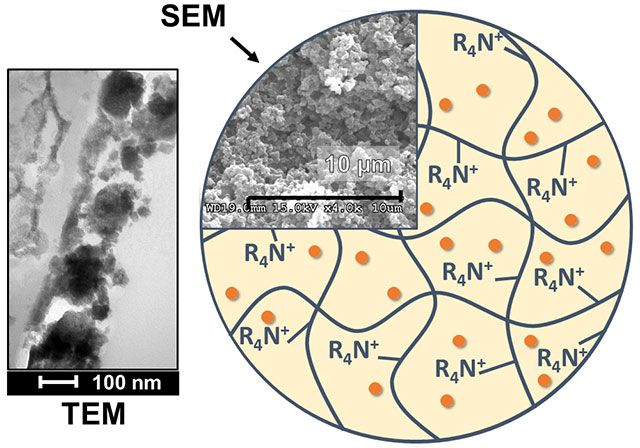Across more than three decades as a professor and leading researcher at Lehigh University, Professor Arup SenGupta has mentored a veritable army of young innovators in the development of solutions that holistically address the problem of groundwater contamination and create sustainable water technologies around the globe, both in developing and developed countries.
In July 2012, three Fulbright alumni — SenGupta, Minhaj Chowdhury and Mike German ’17 Ph.D. — conceived and launched Drinkwell, an innovative start-up, in Lehigh’s STEPS building to bring the University’s water technologies to affected places around the world. Drinkwell has recently captured attention and support from a variety of organizations around the world including the BBC, Forbes magazine and Dell, Inc.
The firm establishes locally-maintained decontamination systems in arsenic-affected areas across India, Laos and Cambodia. Its technology provides villages with water filtration technology and tools to improve community health while generating income and creating jobs.
The World Health Organization calls the arsenic crisis "the biggest mass poisoning in human history” and Human Rights Watch believes some 20 million people are at risk from arsenic poisoning in Bangladesh alone, according to a BBC news report.
The basis of the firm’s technology — a water filtration nanotechnology resin called Hybrid Ion Exchange Nanotechnology (HIX-Nano) — was developed by SenGupta’s research team. The zirconium-based resin removes arsenic from the water, which is then filtered through a series of Drinkwell tanks that remove additional harmful substances.In recent years, SenGupta and his students have extended their technology’s original arsenic-busting powers to attack other contaminants, namely fluoride, phosphate, and lead.
According to SenGupta, a professor in Civil and Environmental Engineering as well as Chemical and Biomolecular Engineering, at least ten Lehigh graduate students over the years have contributed toward Drinkwell’s present status. From 2000 to 2010, confronted with the rising arsenic poisoning of millions caused by contaminated ground water primarily in countries in the South and Southeast Asia, including Bangladesh, Nepal, India, Cambodia and Laos, several of SenGupta’s doctoral students, John Greenleaf ’07 Ph.D., Prakhar Prakash ’04 Ph.D., Prasun Chatterjee ’11 Ph.D, Surapol Padungthon ’13 Ph.D. and post-doc Sudipta Sarkar (2006-2011) became intimately involved in mitigating the crisis.
SenGupta’s current doctoral students, Jinze Li, Chelsey Shepsko and Hang Dong are conducting research to develop appropriate wastewater reuse technologies for California and China, as well as Marcellus wastewater treatment in Pennsylvania. Over the years, inventions resulting from the works of doctoral students have led to eleven U.S. Patents; several of these inventions are in use in different countries, including the United States.
The team’s efforts haven’t gone unnoticed. During the Forbes Under 30 Summit, Drinkwell co-founder Minhaj Chowdhury won the magazine’s first-ever Under 30 Impact Challenge, taking in $500,000 for Drinkwell to continue providing services in India and Bangladesh. At UC Berkeley’s 2015 Global Social Venture Competition, Mike German ’17 Ph.D. won first prize among many competing technology start-ups for his project proposal, “Transforming Arsenic and Fluoride Water Crisis into an Economic Opportunity through Hybrid Ion Exchange Nanotechnology.”
“The use of HIX-Nano has transformed the global arsenic and fluoride crisis into an economic opportunity for those suffering from it,” says SenGupta, “while providing safe drinking water to thousands of people.”


